
July 3, 2000
Volume 22, No. 9
Articles:
ABA Chairman Callaghan Takes ABA Agenda to Eleven Key House and Senate Meetings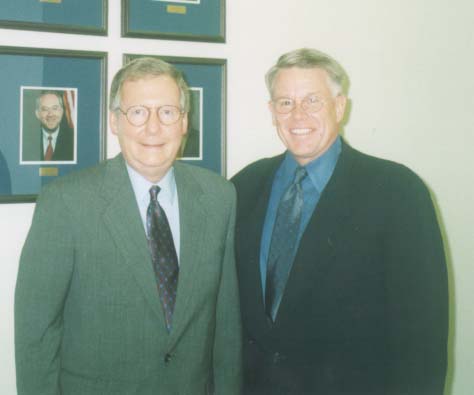 |
| Senator Mitch McConnell (R-KY), Chairman of the Senatorial Committee, with ABA Chairman Pat Callaghan, Pepperidge Farm, Inc., as ABA presents a $25,000 Political Education Fund contribution for Republican Senatorial candidates. |
ABA Chairman Pat Callaghan, Pepperidge Farm, Inc., was on Capitol Hill this week meeting with eleven Congressional Representatives and Senators to discuss several key issues facing the baking industry. Callaghan focused on the ABA- supported ergonomics amendment in the Labor-HHS Appropriations bill, Regulatory Reform and National Uniformity for Food Labeling. ABA picked up several co-sponsors to the regulatory reform and uniformity bills and all congressional representatives and senators agreed to continue to support the ergonomics provision through the budget process with the White House.
Chairman Callaghan also met with Senator Mitch McConnell, Chairman
of Republican Senatorial Campaign Committee and presented the Senator with
a $25,000 Political Education Education Fund contribution for Republican
Senatorial candidates. Callaghan additionally met with Congressman Tom
Davis, Chairman of the House Republican Campaign Committee and presented
Chairman Davis with a $30,000 contribution to support House Republican
candidates.
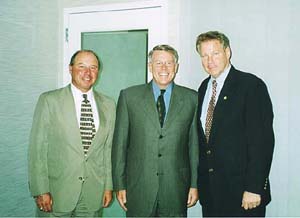 |
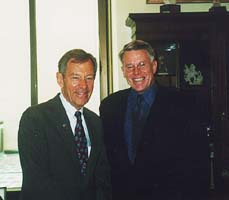 |
| ABA President & CEO Paul Abenante, ABA Chairman Pat Callaghan and NRCC Chairman Rep. Tom Davis (VA, 11th - R) during PEC check presentation of $30,000. | ABA Chairman Pat Callaghan poses wtih Senator George Voinovich (R-OH) after a successful meeting. |
Following the meetings, which took place over a two-day period of time,
Callaghan said "this was a tremendous experience to see first-hand how
effective ABA is on Capitol Hill and to see the positive results of our
members involvement in this process." Callaghan further added, "all of our
members need to appreciate the impact these laws have on grain-based foods
and the value of a strong ABA."
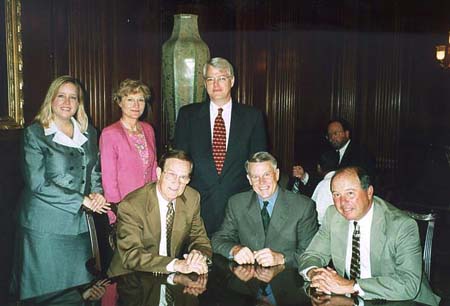 |
| ABA Chairman and staff meet in the Capitol with House Education and Workforce Committee Chairman Bill Goodling (PA-19, R). From left seated: Rep. Bill Goodling, ABA Chairman Pat Callaghan, and ABA President & CEO Paul Abenante. From left standing: ABA V.P., Regulatory & Technical Services Lee Sanders; ABA V.P., Environmental Activities Anne Giesecke, Ph.D.; and ABA V.P., Government Relations Robb MacKie. |
Following the victory in the U.S. House of Representatives, the Senate last week passed an amendment offered by Senator Enzi (R-WY) that would delay the promulgation of OSHA’s Ergonomic regulation for at least one year and push OSHA back to the drawing board in crafting any potential ergonomics rule. The amendment was incorporated in the Labor HHS Appropriations bill that will be sent to the White House.
ABA has been working diligently for two years to see this legislation through. Robb MacKie, Vice President for Government Relations has chaired the business community coalition that provided the lobbying thrust to achieve this vote. Many agreed from the beginning of the debate that this would be a major hurdle to overcome, and a Senate vote passing the Enzi Amendment would be a major victory. White House response to the Labor-HHS Appropriations bill is still in doubt but with both Senate and House passage, it leaves little doubt as to the will of the Congress.
Following the vote, ABA President Paul Abenante indicated, "this was a major victory for the baking industry and business community. This was not a vote about worker safety – it was about process and OSHA’s ‘rush to judgement mentality.’ He further added without our members’ grass-roots support, we simply could not have achieved this vote."
Energy & Environmental Committee Meets in Washington, DC - Tackles Regulatory Agenda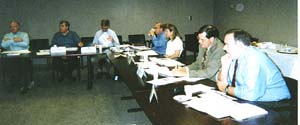 |
| Attendees of ABA’s recent Energy & Environmental Committee meeting held in Washington, DC, listening to a presentation on refrigeration systems. |
The Energy and Environmental Health Committee held a well attended workshop meeting June 20-21, 2000, in Washington, DC. The meeting was chaired by Jerry Hancock of Flowers Bakeries, Inc. and Jim McKeown of Stroehmann Bakeries L.C. The meeting predominantly focused on refrigeration systems. Several speakers presented material from their respective fields of expertise. On the first day, Kent Anderson, President of International Institute of Ammonia Refrigeration, presented information on ammonia refrigeration systems, the current implementation of risk management plans and other compliance issues. Ed Fay, Director of Sales for CMC America, gave a detailed presentation on the use of refrigeration to control dough temperatures in mixers. Interestingly, more cold is not always better, but rather, an optimum efficiency should be reached. To end the session for the day, Velu Senthil, a chemical engineer for the U.S. Environmental Protection Agency gave presentation on the TRI Reporting Program and made available the new TRI reporting package and disk.
Presentations resumed on the second day of the meeting. Sigismondo DeTora, Chairman of Baking Industry and Sanitation Standards Committee (BISSC), described BISSC and its activities.
The Baking Industry Sanitation Standards Committee was formed in 1949 to develop voluntary sanitation standards for the design & construction of bakery equipment. It offers a self-certification program for equipment manufacturers whose equipment meets the criteria of the standards (renewable annually), in addition to a third-party certification program for those manufacturers having the need for independent testing of their equipment. Mr. DeTora emphasized the advantages of well designed equipment in controlling the costs of operation and maintenance.
Devon Barnes, a sales engineer from Frigoscandia Equipment, talked extensively of equipment and refrigerants with special emphasis on ammonia and carbon dioxide systems working independently or together. Last, Rey Forte, Technical Advisor for the U.S. Environmental Protection Agency on climate change, provided the group with the current evaluation of the science of ozone protection and climate change as it relates to the use of refrigerants.
"The availability of refrigerants and the approved uses of alternative
refrigerants is becoming increasingly limited. New technologies will find
limited niche uses. Major capital costs could be in the offing if bakeries
do not plan carefully for the phase out of certain refrigerants and the
limited use of the remaining alternatives," summarized Anne Giesecke, Ph.D., Vice
Environmental Activities and the contact for additional
information.
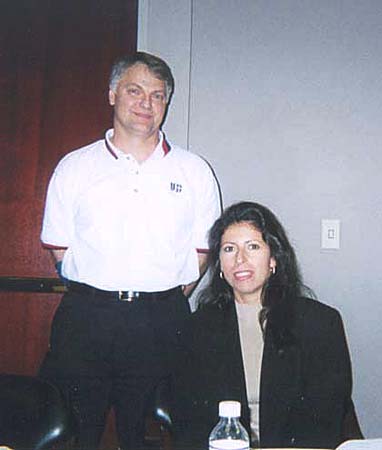 |
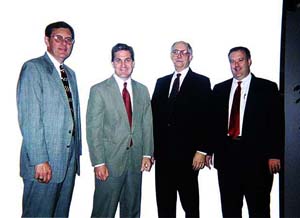 |
| Attendees at the meeting (from left): Steve Guenin, Interstate Brands Corp., and Raffaela Malfara, George Weston Ltd. | Energy & Environmental Committee Cochairs with speakers from the meeting held in Washington, DC (from left): Jim McKeown, Stroehmann Bakeries, L.C. with speakers Ed Fay, CMC America and Kent Anderson, International Institute of Ammonia Refrigeration, and Jerry Hancock, Flowers Bakeries, Inc. |
National Uniformity for Food Legislation Unanimously Passes Senate Ag Committee
On Thursday, June 29, the Senate Agriculture Committee reported the substitute bill for S. 1155 out of committee favorably today by a unanimous voice vote. This legislation would provide for one national standard for safety and warning labels on food products. The substitute bill was offered by Senator Roberts and includes changes agreed to by industry and the Association of Food and Drug Officials including state rights issues. "This is a major victory for ABA and other members of the food industry’s National Uniformity Coalition", said Lee Sanders, ABA Vice President, Regulatory and Technical Services. The Senate bill has 40 cosponsors and the house bill, H.R. 2129 has 116 cosponsors to date. For additional information, please contact Lee Sanders at ABA.
ABA Forces EPA to Listen on Clean Water RuleAnne Giesecke, ABA Vice President of Environmental Activities and Cochair of the Clean Water Industry Coalition, have been successful in halting the Environmental Protection Agency’s (EPA’s) action on the proposed Clean Water TMDL rule. "As stake holders, we now have an opportunity to continue to work constructively with EPA on rule provisions that will improve water quality with reason and efficiency. This is an opportunity to get the program right," commented Dr. Giesecke.
The following language was included in an emergency funding Conference Report passed by the House on June 29 and by the Senate on June 30, 2000: "None of the funds made available for fiscal years 2000-2001 for the EPA may be used to make a final determination on or implement any new rule relative to the proposed revisions to the NPDES program and federal antidegradation policy and the proposed revisions to the Water Quality planning and management regulations concerning total maximum daily loads, published in the Federal Register on Aug 23, 1999."
EPA had planned to make the rule final July 15, 2000; they cannot proceed. If the rule had gone forward in its current form, bakeries could have expected to spend about $1.2 million for wastewater treatment at each bakery. Surcharges and fees would no longer be an option. ABA thanks the members who sent letters and contacted their Congressional offices. ABA will continue to keep you informed about the progress on this rule.
ABA Successful: Regulatory Reform Moves ForwardThe House Government Reform Committee voted on June 29 to move to the floor of the House the regulatory reform bill sponsored by Rep. Sue Kelly (R-NY) and Rep. David McIntosh (R-IN) "Congressional Oversight and Audit of Agency Rulemaking Actions Act." Chairman Dan Burton (R-IN) was instrumental in this action on H.R. 4744.
The bill creates an expertise in the Congress for the review of proposed agency actions to evaluate whether or not the proposal is consistent with Congressional intent. "This provision will give the Congress a critical new tool and improve the business of government," stated Anne Giesecke, ABA Vice President of Environmental Activities. "ABA has been a leader in this effort and will continue to educate the members of the House. We expect a vote this summer."
The Senate passed a compatible bill in May and the Administration will sign the bill. Your continued support with calls and letters to your Representatives in the House is important.
ABA Fleet Committee Discusses Wide AgendaThe American Bakers Association Fleet and Distribution Committee met recently in Baltimore, Maryland to discuss a number of critical issues facing the distribution sector of the wholesale baking industry. Almost 30 bakers gathered to discuss the proposed revisions in the Department of Transportation Hours-of-Service regulations (6-16 Bulletin). The Committee also met with federal EPA and Maryland Department of Environmental Quality officials to learn about the latest in truck emission regulations and diesel testing programs in the Mid-Atlantic region.
"We are particularly grateful to all of the ABA members who sent their fleet and distribution people to this vitally important meeting," said Committee Chairman Chuck Paterakis, H&S Bakery/Northeast Foods. "The exchange with DOT alone was worth their time, and the attendees came away with additional valuable information."
The Committee also engaged in a discussion on driver safety and tools to help improve drivers’ awareness of safety issues. The Committee is exploring a joint meeting with Liberty Mutual to learn about the latest in driver safety issues at a future meeting. The Committee also heard a presentation from Monica Cashen, Rehrig-Pacific, on proper tray handling and design to address possible ergonomic issues. Finally, the Committee heard from John Hueber with the Petroleum Marketers Association on a cooperative pilot program his organization is attempting with the DOT. The Committee is considering applying to the DOT for relief from a number of regulations impacting trucks between 10,000 and 26,000 pounds.
Finally, the Committee discussed the tenuous future of the tray exchange programs in New England and Mid-Atlantic areas. Due to fewer numbers of baking companies participating in the exchange centers, both programs are considering ceasing operations by year’s end.
STATE UPDATE Plastic Packaging Legislation DefeatedLegislation that would increase the statewide recycling rate for rigid plastic packaging containers (RPPC) from 25% to 35% was defeated in the Assembly Committee on Consumer Protection, Governmental Efficiency, and Economic Development at its hearing on June 20. After receiving only four of the necessary five votes, SB 1110 by Senator Wesley Chesbro (D-Arcata) was granted reconsideration to be reviewed by the committee prior to the July 7 deadline for all bills to be reported out of committees. Senator Chesbro had offered amendments to remove food and cosmetic products in response to a successful industry coalition effort to oppose the inclusion of those products in the state’s RPPC program. Assemblyman Mike Machado (D-Linden) raised several questions during the hearing about the intent of the sponsors in proposing to raise the recycling rate without reviewing the existing program. ABA will oppose legislation that increase packaging mandates on product manufacturers. Subcommittee Adopts Anti-GMO School Food Resolution
At its hearing Tuesday night, the Planning and Policy Committee of the San Francisco Commission on the Environment adopted a resolution that calls upon the City and County of San Francisco to give preference to organic food vendors for official functions and urges the San Francisco Unified School District to provide organic meals to its students. The resolution will be scheduled for a vote by the full commission next month. The draft resolution was amended to clarify the issue of safety related to genetically engineered foods. One Biotech Study Bill Advances, Another Stalls
Two bills by Senator Tom Hayden (D-Los Angeles) were debated this week in separate policy committees of the State Assembly.
The Assembly Education Committee held a hearing on SB 1514, a bill directing the Superintendent of Public Instruction to convene a task force to examine methods to communicate information to parents of public school children regarding the nutritional aspects and presence of genetically engineered foods served at public schools in California. The Committee Chair Kerry Mazzoni (D-Marin) suggested expanding the bill to examine issues involving obesity and bone density that have been highly publicized in the media recently. With Mazzoni’s suggestion accepted as an author’s amendment, SB 1514 was adopted by the committee and sent to the Assembly Appropriations Committee for consideration.
Due to the amendments to SB 1514, ABA and other food industry allies will strongly oppose the expanded breadth of the proposal.
On June 21, the Assembly Agriculture Committee held a hearing on SB 1513, a bill to establish a broad-ranging task force to examine issues relating to agricultural biotechnology and labeling schemes. Two weeks ago, the Agriculture Committee adopted industry-supported legislation (SB 2065) by Senator Jim Costa (D-Fresno) with similar provisions. Further consideration of SB 1513 was postponed to a later hearing while efforts are undertaken to econcile these bills.
Tax Initiative Qualifies for November BallotBusiness and Taxpayers for Fair Fees (BTFF) announced this week that a sufficient number of signatures have been verified by the Secretary of State’s office to qualify the "Stop the Hidden Taxes" initiative for the November statewide ballot. On May 4, BTFF submitted more than 1.1 million signatures to the Secretary of State’s office from Californians supporting this measure.
The "Stop the Hidden Taxes" initiative is a constitutional amendment requiring that non-regulatory government-imposed fees on products and services must be adopted like taxes - by a two-thirds vote in the state legislature or at the local level by a vote of the people.
In 1997, the California Supreme Court created a loophole in the law that gives state and local governments sweeping authority to levy higher taxes that affect consumers and businesses without a vote of the people or any accountability as to how the tax collections would be spent. Governments merely have to label the new taxes as "fees."
The constitutional amendment measure led by the California Chamber of Commerce, California Taxpayers’ Association, California Manufacturers & Technology Association and California Farm Bureau Federation would protect businesses and consumers from potentially hundreds of millions of dollars in hidden taxes.
NEW JERSEY Anti-Tampering Bill Introduced In SenateOn June 15, New Jersey Senator Anthony Bucco (R-Denville) introduced S. 1433, legislation that would criminalize the insertion of pamphlets or other writings into consumer products without proper authorization. The legislation would make it a "disorderly persons offense" to stamp, print, place, or insert any writing in or on consumer products or the box, package or other product container without the consent of the owner or manager of the premises where the product is sold or stored, the product manufacturer, the authorized distributor of the product, or the retailer of the product. S. 1433 has been referred to the Senate Commerce Committee. Committee Approves Irradiated Foods Moratorium Bill
At a hearing on June 19, the New Jersey Assembly’s Consumer Affairs and Regulated Professions Committee approved A. 2583 on a vote of 5-0, with one abstention. A. 2583, introduced by Assemblyman John Kelly (R-Essex), would place a five-year moratorium on the sale and distribution of irradiated food in New Jersey. The Consumer Affairs and Regulated Professions Committee, of which Assemblyman Kelly is not a member, is chaired by Assemblyman Jeffrey W. Moran (R-Forked River). The bill now proceeds to the full Assembly, which is not expected to take up the bill before its summer recess. NORTH CAROLINA
Product Labeling Legislation Approved by
Senate
SB 1201 had originally called for additional labeling of perishable foods and granted broad rulemaking authority to the Department of Agriculture and Consumer Services to establish "best if used by" dates in addition to those provided by the manufacturer. With input from industry allies, the amended language now serves only to further enforce existing misbranding and tampering laws, while adding an additional food inspector. The new language allows for the re-labeling of packaged food products if the product’s shelf life has been extended through freezing, cooking or certain other processes but does not enact any mandatory labeling requirements for manufacturers.
The appropriations bill containing the text of SB 1201 will be discussed in a Senate/House conference committee soon. The Legislature is expected to adjourn within two weeks.
Organic & Biotech
Legislation
Another item to be addressed this fall in Michigan includes legislation on biotech labeling mandates (HB’s 5395 and 5399, by Baird and Martinez).
ELDC Meeting
Fall Public Policy Forum
September
17-19, 2000
Wyndham Hotel Washington, DC
ABA’s Executive Leadership Development Committee is holding its next meeting September 17-19 in Washington, D.C. ABA strongly encourages companies to send executives to attend this meeting. ABA believes that this annual forum is an incredibly valuable career development tool; it helps prepare baking industry executives for leadership roles in their companies. Meeting registration materials will be mailed out in the near future. Please call Kelly Barbour at ABA if you would like to be on the mailing list.
Tentative Agenda Highlights:
Golf
Evening Reception with Mystery Speaker
Opening Remarks by Patrick Callaghan, Pepperidge Farm (Invited)Lunch Speaker, Dan Malovany, Executive Editor, SnackFood & Wholesale Bakery - "Current Trends and Status of the Baking Industry"
Lobbying Seminar: ABA Issue Review & Grassroots Techniques, Robb Mackie, ABA & Lee Sanders, ABA
Dinner Debate - 2000 Presidential Election andKey Issues
November 2000 Presidential and Congressional Election Update - John Morgan, Pollster (Invited)Group Congressional Lobbying Visits - Capitol Hill